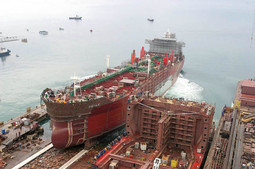Published in Nacional number 685, 2008-12-30
Political report
Sanader's illusions of a shipyard salvage
Although the Prime Minister is insisting that he will not shut down unprofitable shipyards, Britain and Poland had to abide by the demands of the European Commission, and so will Croatia
 Damir Polancec"I do not think at this moment that anyone in Government, from Prime Minister Ivo Sanader to Damir Polancec and Ivan Suker, can say with certainty how they will resolve the problem of the shipyards. It is clear to all that if the demands from Brussels are not accepted the chapter on Competition Policy will not be opened, and every delay, with the existing Slovene blockade, threatens to drag the talks out to 2010. That would be a bad development, and I would say that we will try to secure at least a compromise solution, such as a delay on shutting down at least some shipyards. In any event, we expect the continuation of the negotiations by the second half of January, and if we do not succeed in arriving at a compromise, I fear the significant social unrest the unions have said they will undertake. The other possibility is a delay in the negotiations with the European Union, but that would be an even worse solution," Nacional was told a few days ago by an official close to Government.
Damir Polancec"I do not think at this moment that anyone in Government, from Prime Minister Ivo Sanader to Damir Polancec and Ivan Suker, can say with certainty how they will resolve the problem of the shipyards. It is clear to all that if the demands from Brussels are not accepted the chapter on Competition Policy will not be opened, and every delay, with the existing Slovene blockade, threatens to drag the talks out to 2010. That would be a bad development, and I would say that we will try to secure at least a compromise solution, such as a delay on shutting down at least some shipyards. In any event, we expect the continuation of the negotiations by the second half of January, and if we do not succeed in arriving at a compromise, I fear the significant social unrest the unions have said they will undertake. The other possibility is a delay in the negotiations with the European Union, but that would be an even worse solution," Nacional was told a few days ago by an official close to Government.
The not at all optimistic forecast put forward by this well-informed politician is based on demands that have come out of the European Commission. The loin's share of the content is known – a 40 percent reduction in the capacity of our shipyards is demanded of Croatia, a halt on subsidies amounting to several billion kuna, and the privatisation of the shipyards, with a red light on Government's proposal that 25 percent of the shares by distributed to shipyard employees.
In order to preserve social peace in the holiday season, Ivo Sanader to Nova TV's prime time news Dnevnik that he was "sure that the European Commission would back down, and Government together with the unions will manage to save the shipyards as shipyards." However nice the Prime Minister's words ring, there is almost no real chance that things will turn out that way. The European Commission has made it clear that the current political subsidies are entirely unacceptable, and are not carried out in any of the EU member countries. Shipyards in Great Britain, Spain, Germany, and recently in Poland, have already been shut down because they are unprofitable. The Commission is demanding of Croatia, just like of other countries, that three conditions be met: long term operation at a profit, the existence of compensation measures in the event of disruptions in the market, and the obligation that most of the restructuring funds have to be covered from the resources of the shipyards themselves.
If the Sanader administration were to persist in the latest of the Prime Minister's promises it would unavoidably lead to a standstill in the negotiations with the European Union. There is simply not even the smallest chance that the European administration would abandon for Croatia's sake a policy it has been carrying out the past decade and to which some of the leading members of the EU had to consent to. Seen from that perspective, either Sanader have indicated a strengthening of Euro-sceptical policies in 2009, or his statement is nothing more than buying social peace with unions that represent 11,000 employed in the shipbuilding industry.
So far, the Government in Zagreb has decided on the amount of subsidies to the economy, but with the accession to the Union it is the European Commission in Brussels that will decide on which Croatian companies receive subsidies. In the EU domestic governments have the right to propose who needs subsidies, but it is the Commission that makes the final decision. This rule was made to reduce to a minimum the influence of national governments and the protection of any given company or sector. When Croatia does finally become a member of the EU the fate of Rijeka's Treci maj or Brodosplit will be decided by the administration of the European Union, and not by economy minister Damir Polancec of Croatian Prime Minister Ivo Sanader.
In September 2006, the Croatian Competition Agency approved state subsidies for the rehabilitation of four shipyards to the tune of 4.2 billion kuna. The Brodosplit shipyard received 1.687 billion, Rijeka's Treci maj 1.670 billion, Brodotrogir 625 million, and the Kraljevica shipyard 221 million kuna. But to accede to the European Union – where subsidies account for about 0.6 percent of the GDP – Croatian has to drastically reduce subsidies to the economy, and forecast show that some sectors are then threatened with failure, shipbuilding above all.
Government has for years not succeeded in finding a solution for shipbuilding, which was evident again this spring when its plan to restructure six Croatian shipyards was rejected by the Croatian Competition Agency, acting in line with EU directives, as "not good enough." At the Agency they concluded that the proposed measures would not secure profitable operations, and that shipbuilding would in the future continue to survive only on the basis of massive subsidies, measured in billions of euro.
 Rijeka's Treci maj shipyardOver recent years on the Uljanik shipyard in Pula has operated at a profit. All of the others are millions of dollars in the red and with an ever shorter list of orders for new ships. Besides, over the past decade several thousand employees, including many highly educated experts, have left Croatia for various European shipyards. "The European Commission will quite certainly not back down, especially when it comes to demands to scrap state subsidies. Likewise, Polancec and Sanader are buying time when they say that they will insist that domestic shipyards do not accept a change in their basic activity, and to stick to building ships even when that is unprofitable. The EC did not accept that even when coming from much more powerful countries, such as Great Britain, Poland or Germany, and why would they now agree to requests coming out of Croatia," Nacional was told by a Government official who is frequently in contact with representatives of the European administration in Brussels.
Rijeka's Treci maj shipyardOver recent years on the Uljanik shipyard in Pula has operated at a profit. All of the others are millions of dollars in the red and with an ever shorter list of orders for new ships. Besides, over the past decade several thousand employees, including many highly educated experts, have left Croatia for various European shipyards. "The European Commission will quite certainly not back down, especially when it comes to demands to scrap state subsidies. Likewise, Polancec and Sanader are buying time when they say that they will insist that domestic shipyards do not accept a change in their basic activity, and to stick to building ships even when that is unprofitable. The EC did not accept that even when coming from much more powerful countries, such as Great Britain, Poland or Germany, and why would they now agree to requests coming out of Croatia," Nacional was told by a Government official who is frequently in contact with representatives of the European administration in Brussels.
The existing EU policy related to shipbuilding confirms his opinion. 20 percent of the world's shipbuilding takes place in the European Union, with an annual turnover of 15 billion euro, with a further two billion or so on overhaul jobs. There are 100,000 people employed directly, while the number of subcontractors is three times that. In comparison with these indicators, Croatian shipbuilding makes up 6-9 percent of European shipbuilding, but the problem is in its lack of competitiveness. Sophisticated and quite expensive vessels such as cruisers and small series of specialised ships are manufactured in Europe. Croatia manufactures simple ships such as tankers, and those kinds of ships are produced, a significantly lower cost, by Asian countries such as Korea and China.
 Slavko LinicWhen they realised in the Union that they were not competitive with their Asian competitors, most shipyards in Great Britain, Sweden and the former East Germany were shut down as unprofitable. Massive protests broke out in northern Spain last month as the result of shut downs in some of the shipyards there, leaving 400 people out of a job. Poland is a particular problem, where the Government has illegally spent 200 million euro out of EU funds to subsidise shipbuilding. A dispute of many years between Warsaw and Brussels was finally resolved recently when the Polish agreed to close two of the three large shipyards, in Gdynia and Szczecin. There is only the shipyard in Gdansk now, also unprofitable, but surviving for the moment because of the fear that the shut down of the factories where the Solidarity union was established would lead to massive protest and riots. But even the Polish had to cave in and abandon unprofitable manufacturing because they would, otherwise, have paid an even greater price, the loss of support from European funds. The unions have announced strikes, protests and even a blockade of the shipyards.
Slavko LinicWhen they realised in the Union that they were not competitive with their Asian competitors, most shipyards in Great Britain, Sweden and the former East Germany were shut down as unprofitable. Massive protests broke out in northern Spain last month as the result of shut downs in some of the shipyards there, leaving 400 people out of a job. Poland is a particular problem, where the Government has illegally spent 200 million euro out of EU funds to subsidise shipbuilding. A dispute of many years between Warsaw and Brussels was finally resolved recently when the Polish agreed to close two of the three large shipyards, in Gdynia and Szczecin. There is only the shipyard in Gdansk now, also unprofitable, but surviving for the moment because of the fear that the shut down of the factories where the Solidarity union was established would lead to massive protest and riots. But even the Polish had to cave in and abandon unprofitable manufacturing because they would, otherwise, have paid an even greater price, the loss of support from European funds. The unions have announced strikes, protests and even a blockade of the shipyards.
The Social Democratic Party is advocating an opinion similar to that of the unions – in June it submitted an interpellation on shipbuilding into parliamentary procedure, and Slavko Linic and Ljubo Jurcic opposed privatisation, reminding that a process was at issue already seen in the 1990s, when economic conversion saw the wholesale plunder of Croatia's leading companies. Croatian People's Party president Radimir Cacic has also opposed privatisation, but not the scrapping of subsidies. Cacic is convinced that shipbuilding can be salvaged without laying off part of the workforce.
Unlike him, Sanader is saying, during the Christmas holidays, that there would be no laying off of workers, much less that shipyards would have to shift their operations to other lines of business. As an argument backing his promise he used Polancec, saying that he was "doing a very good job leading the negotiations with the European Commission." Given that the Prime Minister is very close to making the decision to let Polancec go, and that he as an equal measure of confidence in him, one can judge the weight of his holiday promise to workers employed in shipbuilding.
Related articles
Sanader’s eight fear SDP — Won’t bring down Government
Despite forecasts that he would, former Croatian Prime Minister Ivo Sanader, who recently took his seat in Parliament, will not work from the house… Više
Latest news
-
28.10.2010. / 14:15
'A profitable INA is in everyone's interest'
-
28.10.2010. / 09:38
Sanader’s eight fear SDP — Won’t bring down Government
-
21.10.2010. / 15:02
Interior Ministry turned a blind eye on Pukanic assassination
-
20.10.2010. / 09:34
Barisic could bankrupt HDZ




